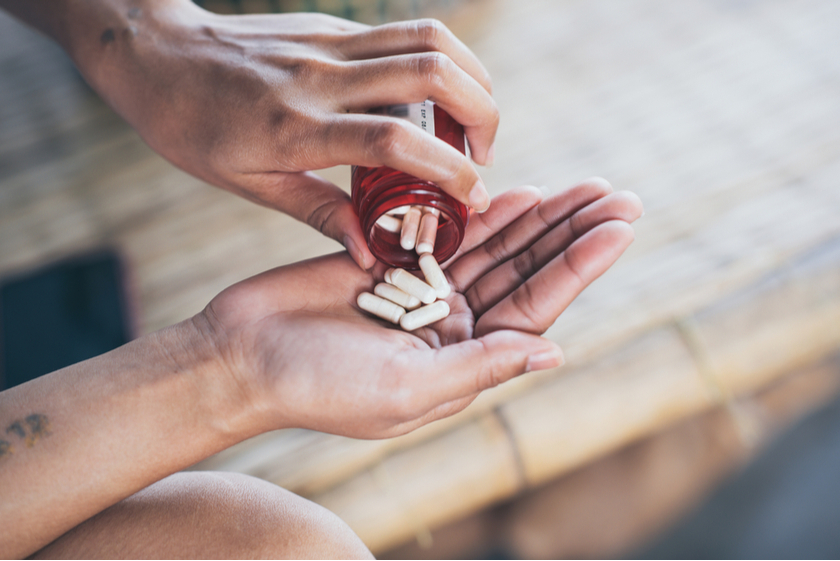Do Antibiotics Cause Constipation? 3 Effective Ways to Prevent It
A focused analysis of the side effects of antibiotics on the digestive system and the best solutions to deal with constipation.

Constipation caused by antibiotics is a common problem in children and adults worldwide.
This condition is worsening due to the increasing number of people self-medicating, thus misusing this type of medication for treating infections caused by bacteria.
Together with our team of specialists, we discovered the main causes and effective ways to solve constipation without complications. Find out how to deal with it to boost your gut health.
Do Antibiotics Cause Constipation?
Yes, constipation is one of the side effects of antibiotics. Antibiotics are widely used because of their important role in treating bacterial infections.
It is not advisable to use antibiotics without the proper medical prescription to avoid both their adverse effects and bacterial resistance, a condition that could complicate the treatment of future infections and compromise your gut health.
If you are taking antibiotics and experiencing gastrointestinal discomfort, don’t stop taking them until your doctor tells you to do so to not cut off the medication’s effect. You should only discontinue the medication immediately if you have allergic reactions such as an itchy skin rash or wheezing.
Why Do Antibiotics Cause Constipation?
Antibiotics have the ability to kill pathogenic bacteria that enter the body; however, they also kill some of your normal gut flora. In addition, they can be toxic and cause constipation.
The population of friendly bacteria in your gut is massive, with an estimated 10–100 trillion species working together as part of the immune system. This bacterial population is affected by the diet and medications you consume and is built up from the day you are born.
In order for your bacterial flora to protect you, you must control stress and your overall well-being by living a healthy life. This way, you will be able to digest food well and take advantage of all the nutrients provided by your diet.
Thank you for your answer
Health Reporter Surveys
What Are Other Potential Side Effects of Antibiotics?
Constipation does not come alone, antibiotics disrupt your normal flora, and it is usually accompanied by different gastrointestinal symptoms that can affect your well-being. The most common are:
Vomiting
Vomiting may occur if intestinal movement is slowed due to the use of antibiotics that affect its function. Furthermore, if you have constipation, a clogged intestine might be followed by episodes of vomiting and stomach upset.
Bloating
Bloating is one of the most common effects of antibiotic use and resolves once you finish the treatment. When it is associated with constipation, it may be the result of intestinal obstruction, which causes gas to accumulate in the digestive tract.
Fortunately, there are a number of bloating supplements that help regulate bowel movements to reduce constipation by providing a good amount of soluble fibers and promoting the thriving of the gut flora. They also help cleanse the gut and reduce cravings which makes them a useful supplement if you are on a diet.
Loss of appetite
Antibiotics can cause loss of appetite due to the direct effect they have on the digestive system. Plus, if you have constipation and bloating, the discomfort can take away the urge to eat.
How to Prevent Constipation?
Lifestyle changes and modification of the classic ultra-processed eating patterns are key points in preventing and treating constipation. The 3 most effective ways to prevent this condition are:
Staying hydrated
During antibiotic treatment, it is important to stay hydrated, especially if episodes of constipation are alternated with diarrhea.
Water will help move stool through the intestine and prevent bacterial overgrowth that can occur due to obstruction, disallowing harmful bacteria to continue to multiply.
Eating high-fiber foods
Foods such as whole grains, legumes, whole-wheat bread, and vegetables will be your best allies to promote bowel movements and prevent constipation as they provide food for your gut flora thanks to their prebiotic action.
Eating foods high in good bacteria
Probiotic foods, which contain good bacteria, are beneficial when taking antibiotics because they keep your gut filled with microorganisms capable of maintaining a strong immune system to combat bacterial, parasite, and viral diseases.
Taking probiotics as a supplement and eating fermented foods containing probiotics is an effective method to improve digestion. Fermented foods rich in probiotics that populate your gut flora are:
- Yogurt
- Kefir
- Sauerkraut
- Kimchi
- Kombucha
- Tempeh
A Word From Our RD
The use of antibiotics is very frequent since it is the main treatment for bacterial infections. Its misuse has spread due to self-medication with previously prescribed antibiotics that people keep on their shelves.
It is not recommended to use them without a prescription despite having symptoms such as fever because not all infections require antibiotics. Your doctor should do the necessary tests to know if there is a viral or parasitic infection, which requires another type of medication.
Antibiotics destroy your good bacteria, allowing C. difficile, a bacterium that causes severe watery diarrhea, to grow. This infection can cause dehydration and other major health issues.
Conclusion
Consumption of antibiotics has a direct impact on gastrointestinal health because it modifies the population of gut bacteria. This can cause symptoms such as chronic constipation, abdominal pain, vomiting, diarrhea, bloating, and loss of appetite.
All these symptoms can lead to complications such as dehydration, fatigue, rectal bleeding, and overgrowth of bacteria that can affect other body systems.
The best way to prevent this and improve your gut health is to avoid self-medication. You should take medications only when it is prescribed by your healthcare provider.
Digestive distress can affect your daily activities. A balanced and healthy diet containing high-fiber foods, probiotics to enhance your gut bacteria, and plenty of water will be your greatest ally in fighting constipation and aiding pain relief to give you the comfort you need for energy and vitality.

















































 Select your language:
Select your language: 








